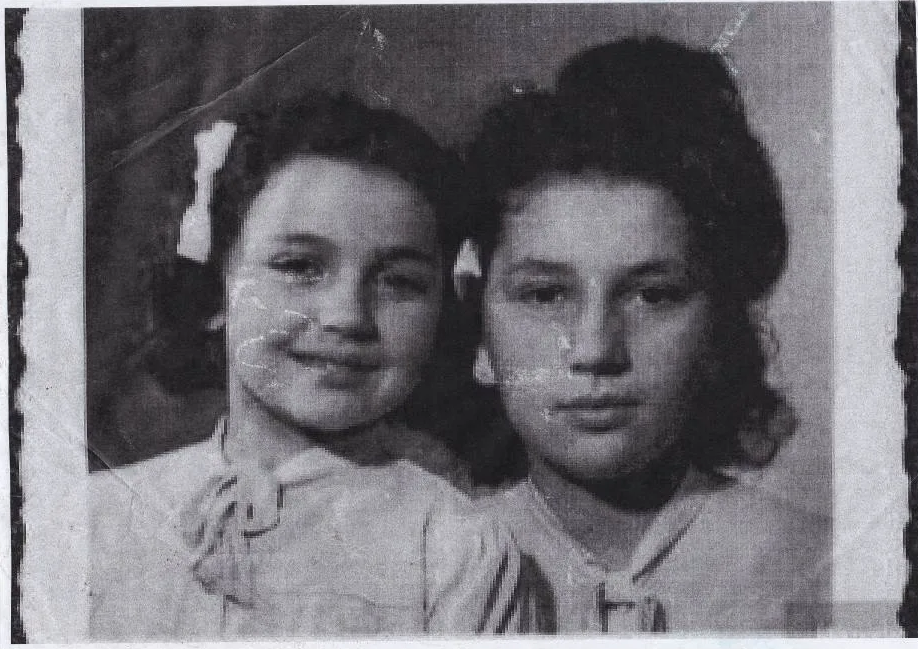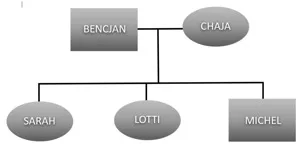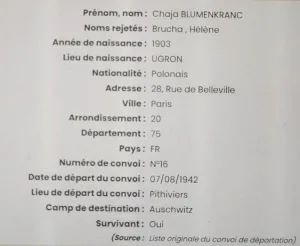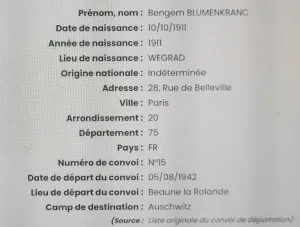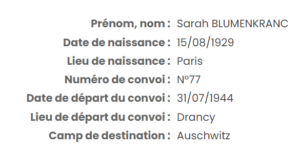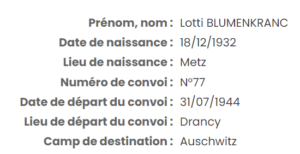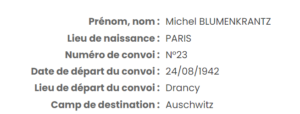Sarah BLUMENKRANC
Project overview
We are a group of six 9th grade girls: Eloïse, Emma, Roudiedji, Leilani, Julie and Noélie. We have been researching the life stories of Lotti and Sarah Blumenkranc, two Jewish girls who were deported on the 77th transport from France on July 31, 1944. This was the last of the large deportation convoys of Jews that left the Drancy internment camp for the Auschwitz-Birkenau concentration and extermination camp.
We are working in partnership with the Convoy 77 non-profit organization, which aims to retrace the lives of the people who were deported on Convoy 77 by compiling their biographies in tribute to them.
We were very sad to find so little available documentation about these two girls but we have tried our best to bring them back to life.
The Blumenkranc family
The Blumenkrancs were a Jewish family, all of whom were forcibly deported during the Second World War (1939-1945), but not to the same places or at the same time.
This family was made up of Chaja, the mother, and Bencjan, the father, and their three children Sarah, Lotti and Michel. They lived together as a family at 28 rue de Belleville in the 20th district of Paris, France.
Before the war
Chaja, whose birth name was Chaja Brucha Hélène Zylberstejn, was born in 1903 in Ugron, Poland. She was a knitwear worker.
Bencjan (Bengem) Blumenkranc was born on October 10, 1911. His year of birth varies from one record to another, but he is thought to have been born between 1909 and 1911, in Wegrad (Węgrów) in Poland.
It is not clear when Bencjan married Chaja, or when they emigrated to France, but we suppose it was before 1929, since that was the year in which Sarah, their first daughter, was born in France.
Sarah Blumenkranc was born on August 15, 1929 in Paris while Lotti was born on December 18, 1932 in Metz, in the Moselle department of France.
The sisters had a younger brother called Michel, who was born in the 14th district of Paris on November 14, 1938. These birthplaces are thought-provoking in themselves, and suggest that some of the family may have stayed behind in Moselle.
In 1939, the Second World War began, pitting the Axis powers, led by Germany, against the Allies. Marshal Pétain signed the armistice on behalf of France in June 1940, and the Germans then occupied the country. From then on, European Jews living in France began to be arrested and deported.
The separation
Chaja and Bencjan entrusted their daughters Sarah and Lotti to a gentleman in Ozoir-la-Ferrière in the countryside of the Seine et Marne department of France, no doubt to try to keep them safe from harm. They did not do the same with their son Michel, however, probably because they thought he was too young to be separated from them.
On July 16, 1942, Chaja, Bencjan and Michel were arrested during the “Vel d’Hiv” roundup in Paris. They were then interned at the Beaune-la-Rolande camp in the Loiret department of France.
Bencjan was deported on August 5, 1942, on the 15th convoy, which left the Beaune la Rolande camp for Auschwitz in Poland. According to information from the Shoah Memorial in Paris, he was shot while trying to escape from Auschwitz.
Chaja was deported on August 7, 1942, on the 16th convoy, from the Pithiviers camp. She too was sent to Auschwitz, where was selected to stay in the camp to carry out forced labor and was assigned prisoner number 15987.
As for little Michel, he was transferred alone to the Drancy camp in Seine Saint Denis, to the north of Paris. A few days later, on August 24, 1942, at just 4 years of age, he was deported on convoy 23 to Auschwitz. He must have sent to the gas chambers and murdered as soon as he arrived, given that he was too young to work.
After their parents and brother were deported in July 1942, the gentleman who had taken in Sarah and Lotti took them to the OSE (Oeuvre de secours aux enfants), a children’s aid organization that ran a secret rescue network in France during the Second World War. When their parents failed to come back for them, he must have felt himself at risk.
They were later sent to stay in an orphanage on avenue Secrétan in Paris, also known as UGIF-70: The UGIF was the Union Générale des Israélites de France, or General Union of French Jews.
On the Shoah Memorial website, we found a list stating that Chaja, when she was a prisoner in Auschwitz, sent a letter to her daughters to tell them what was happening. This letter was sent via the Brief-Aktion program at Auschwitz Birkenau. Letters from deportees were forwarded to the UGIF. Chaja probably wrote the letter in 1943, as a lot of correspondence was sent that year. The deportees were forced by the Nazis to send news to their loved ones in order to put their minds at rest and to hide the terrible truth of what was happening in the camps. The Nazis also used this as a means of finding out the addresses of Jews who were living in hiding. The letters had to be written in German.
The deportation
Sarah and Lotti were rounded up in the children’s home on avenue Secrétan during the week of July 22-25, 1944. In retaliation for Resistance activities, Aloïs Brunner, the commandant of Drancy camp, ordered the arrest of the children in the UGIF homes in and around Paris. The two girls must have been terrified and had no idea of what was going on. They spent a few days in Drancy camp and were then taken by bus to the nearest railway station, where they were loaded into cattle cars.
They were deported on the 77th convoy, which left Drancy on July 31, 1944, bound for Auschwitz-Birkenau. They spent three days in the cattle car, having to live with the terrible smell, the poor hygiene, little food or water, and the fact that it was just the two of them, separated from their parents and their brother. They must have been scared to death.
They were murdered in the gas chambers as soon as they arrived in Auschwitz. Lotti was by then 11 years old while Sarah was 14.
The liberation
Chaja was liberated from the Bergen-Belsen camp in Germany on April 15, 1945, by the British army. She was repatriated to Paris on May 26, 1945, the only member of her family to survive the Holocaust.
When she came back after having been deported, her apartment had been taken over by someone else, so she went to stay with some friends. When eventually she got her apartment back, it was empty, so she asked the Paris City Hall social services department for some furniture.
According to the social workers, she was suffering from severe depression, having just found out that she had lost her husband and three children. No attempt was made to seek information about what had happened to Lotti and Sarah. We can only imagine that as their mother, she was too depressed to do anything, our perhaps she just gave up on life and allowed herself to die.
Sources:
- The Shoah Memorial and AJPN websites
- Karen Taïeb, Lettres d’Auschwitz, (Letters from Auschwitz) paperback book


 Français
Français Polski
Polski